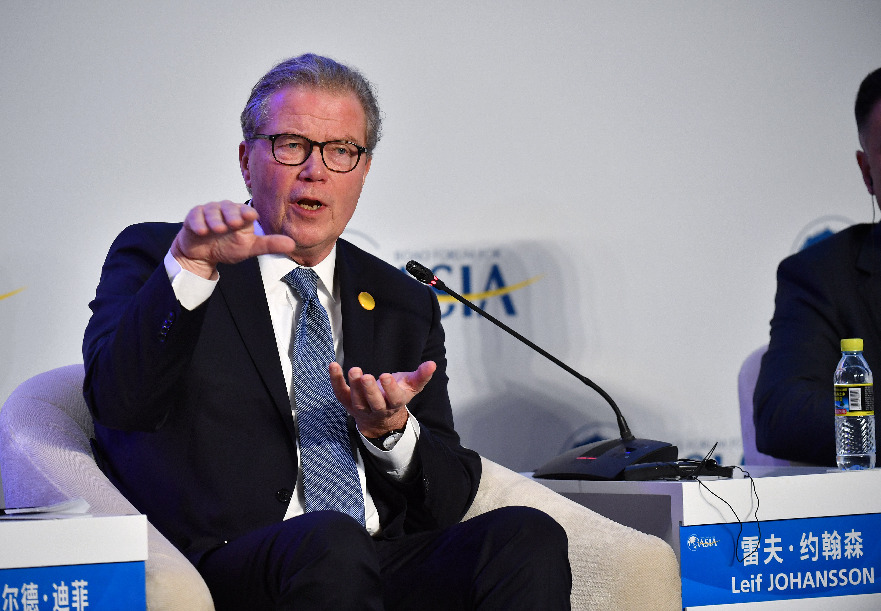
Leif Johansson, chairman of the board of AstraZeneca, speaks at the session of "The Era of 'AI+'" during the Boao Forum for Asia annual conference in Boao, south China's Hainan Province, March 27, 2019. (Xinhua/Guo Cheng)
FUZHOU, June 29 (Xinhua) -- Leon Wang, 47, used to suffer from asthma attacks every winter as a child, and each time he felt like he was dying.
He still remembers the day when his father took him on his back all the way to the hospital because the asthma attack occurred late at night and the bus was not in service. His mother, trying to catch up with them, kept tumbling on the bumpy, muddy road in the dark.
When Wang joined the pharmaceutical firm AstraZeneca China in March 2013, he was surprised to find that parents from neighboring provinces still rushed their kids to Shanghai's big hospitals for nebulization treatment due to the lack of equipment at local clinics.
Wang, now the executive vice president of AstraZeneca, launched the Smart Nebulization Center program, along with the company's partners, to offer a management solution for community-level medical institutions in treating children with respiratory disease.
So far the program has helped build over 17,000 pediatric nebulization treatment rooms across the country.
The program is among the company's latest efforts to weave itself into China's economic and social tapestry. Like many foreign investors, the company remains bullish about the long-term prospects of the Chinese economy.
With approximately 13,200 employees throughout the country, AstraZeneca China achieved sales of nearly 3.8 billion U.S. dollars in 2018. Wang said the company was poised to add 3,000 jobs within this year.
"We are very committed to the Chinese market since we entered China in 1993, and we expect a large opportunity for growth with increasing domestic demand for quality medical services," Wang said.
The London-headquartered pharmacy giant's confidence in China is echoed by a number of global business leaders, many of which are strengthening their presence in China.
Dow Inc., a U.S.-based multinational, recently broke ground on a new silicone specialty resin plant in Zhangjiagang of eastern China's Jiangsu Province, following the opening of a new Polyurethane Systems plant in the city and a new coatings emulsions plant in Chengdu last year.
"China is not only a strategic market, manufacturing and innovation hub for Dow but also an important part of the international supply chain of Dow," said Dow CEO Jim Fitterling, who attended the groundbreaking ceremony on June 21.
Their remarks came amid rising concern that the intense trade impasse between China and the U.S. may dampen the multinationals' prospects of the Chinese economy and force them out of China.
Official statistics show that from January to May actual foreign investment in China amounted to 369.06 billion yuan (about 55 billion U.S. dollars), up 6.8 percent year on year, with some 16,460 foreign-invested firms newly-established.
COMPELLING DESTINATION FOR INVESTMENT
Though in the crosshairs of the trade frictions, multinationals still consider China a compelling destination for its strong domestic consumption demand and business environment.

Morning view of the Lujiazui area in Pudong of Shanghai, east China. (Xinhua/Ren Long)
Kern-Liebers Taicang Co., Ltd., a German-invested auto parts producer about 50 km north of downtown Shanghai, now exports only 10 percent of its products as China's domestic demands grow. The ratio was about 50 percent around a decade ago.
Despite the sluggish market of passenger vehicles in recent years, Richard Zhang, CEO of the company, is optimistic about the long-term auto market because of China's large population and growing purchasing power.
"Chinese people's growing demand for high-quality products calls for economic restructuring and industrial upgrading, which is a great opportunity for 'Made in Germany' and German enterprises operating in China," Zhang said.
AstraZeneca China has also expanded its investment in R&D and manufacturing and collaborated with the Chinese government, industry and hospitals to develop disease management solutions using big data, IoT and AI technologies.
"China's technology edge is making itself a leader of global commercial innovation rather than a follower," Wang said.
Earlier this year, it announced support for building the Wuxi International Life Science Innovation Campus, which is intended to function as an incubation platform that integrates early-phase R&D, innovation, demonstrations and professional services for both domestic and foreign companies. The park is expected to be opened this September.
The executives applaud China's efforts to build a market-oriented and law-based business environment. China lowered the value-added tax rate starting April 1 to reduce business burdens and removed duties on the raw materials for some medicines.
Fitterling said China's pursuit of green development during rapid urbanization would present great opportunities.
"To support the 300 million people expected to move to cities in the next two decades, China will need to offer energy efficient and comfortable housing, advanced infrastructure, clean water and air -- several challenges which match Dow's product offering," he said.



